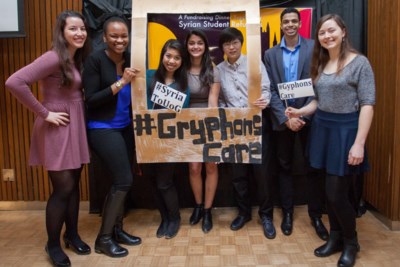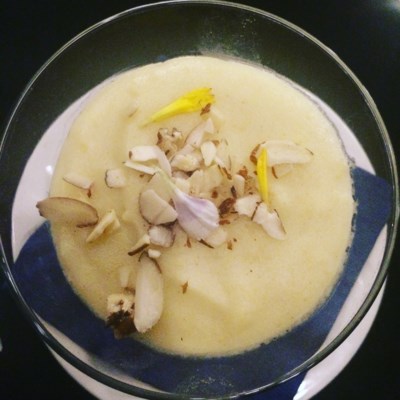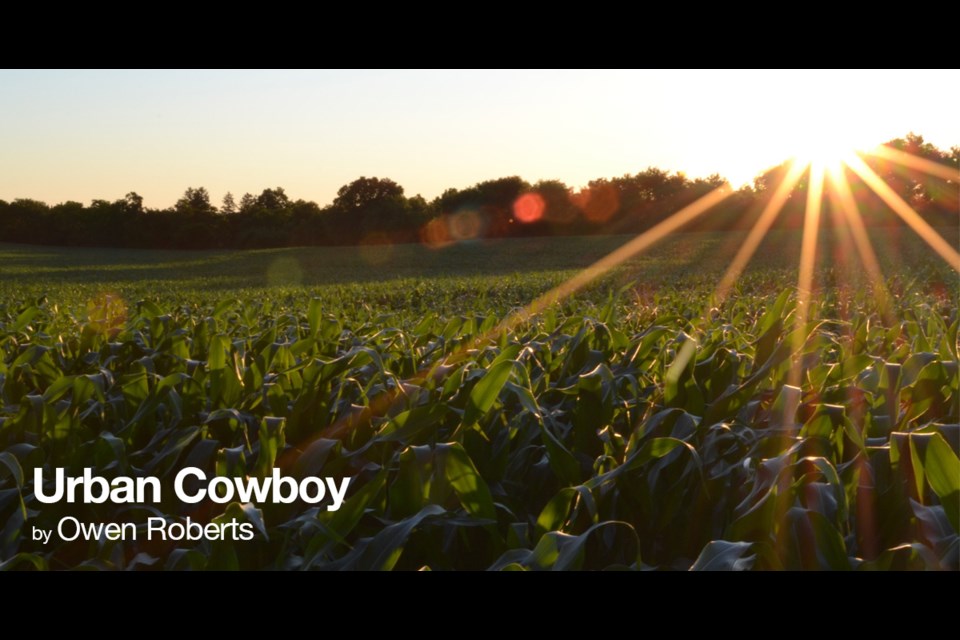Food is always on the move, across the province, across the country and across the world.
Look around at the variety we have in every supermarket in every city, and the assortment of restaurants serving food from around the world. Even if it’s not a wholly authentic representation, food is a fun and exciting way to experience another culture without actually leaving your hometown.
 The University of Guelph's Office of Intercultural Affairs participated in the Syrian fundraiser and offered up a fun photo experience. From left: Jacqueline Gratton, Yassin Sagnia, Katie Lo, Erin Nichol, Haoran Qi, Charles Paco and Jessica Davidson. Photo by Mido Melebari.
The University of Guelph's Office of Intercultural Affairs participated in the Syrian fundraiser and offered up a fun photo experience. From left: Jacqueline Gratton, Yassin Sagnia, Katie Lo, Erin Nichol, Haoran Qi, Charles Paco and Jessica Davidson. Photo by Mido Melebari.Guelph had an opportunity to experience a bit of Syria last week, when the Gryphons Care program presented a well-orchestrated fundraising dinner for Syrian refugee students at the University of Guelph. U of G Multi-Faith Resource Team, U of G Student Life, the local committee of World University Service of Canada (WUSC) and University itself staged the event for a crowd of about 200 people.
This fundraiser was full, and meaningful. President Franco Vaccarino got it underway, noting that the University of Guelph stepped up its sponsorship of refugee students this year to include two Syrian students. One of them, Sara Kuwatly, later told of her challenges and adjustments coming to Guelph, and thanked the community for its openness.
 University of Guelph student Sarah Kuwatly, pictured here at the Syrian fundraiser, spoke about the challenges of being a refugee. Photo by Mido Melebari.
University of Guelph student Sarah Kuwatly, pictured here at the Syrian fundraiser, spoke about the challenges of being a refugee. Photo by Mido Melebari.Syrian folk dance troupe gave a spirited performance of a traditional dance, and later, a Syrian storyteller colourfully explained how the country initially won its independence. A representative from the Syrian advocacy and support group, Najda Now, explained how the country has been demolished by civil war.
Emotionally, real highs, and real lows, as you’d expect.
Food, as it always does, helped pull it altogether. The menu: Syrian red lentil soup, eggplant maqlooba, zucchini tomato stew, fattoush salad, and mamounia, a Syrian semolina wheat pudding, for dessert. It was prepared and presented with aplomb – and homestyle, for the most part -- by the University’s Hospitality Services unit, led by executive chef Vijay Nair.
 Mamounia is a traditional Syrian wheat pudding, made here with Canadian semolina. It was the final menu item at the University of Guelph Syrian fundraiser. Photo by Angi Roberts.
Mamounia is a traditional Syrian wheat pudding, made here with Canadian semolina. It was the final menu item at the University of Guelph Syrian fundraiser. Photo by Angi Roberts.Homestyle, where everyone shares by drawing food for their plate from a common bowl or dish, immediately creates an intimate environment of respect and cooperation…just like the Syrian refugee effort itself.
In introducing the meal, University of Guelph food laureate Anita Stewart noted how farmers in what is now modern-day Syria were among the first ever to cultivate crops, mentioning einkorn wheat, barley and lentils.
“The earliest site of what we know think of as agriculture was Tell Abu Hureyra, and it’s there that the early remnants of these massively important crops were found to be cultivated,” she said.
The wonderful irony in all this is that Canada – mainly Saskatchewan -- is now the world’s biggest exporters of red lentils, a particularly noteworthy item this year, the International Year of Pules. In 2015, lentils were the province’s leading agri-food export…which is astounding, given the amount of wheat it also produces. But they’re a high value crop, lucrative for farmers.
Not all lentils are exported. They’re consumed domestically too; in fact, at last Monday’s fundraiser, the Syrian red lentil soup was made not with imported lentils, but rather with Canadian lentils.
And the Syrian semolina wheat pudding was also made from Canadian semolina.
In her remarks, Stewart paid homage to Syria for its contribution to Canada’s food chain.
“Tonight we are not only celebrating the arrival of new immigrants, we are eating food based on the history of Syria, and reflecting on how our nation has benefitted so greatly because of these ancient and delicious crops,” she said.
Talk about full circle.
Many millennia ago, lentils were local food in what is now Syria, cultivated by farmers there and eaten by local people. Today, they’re more local to Canada than they are to any other exporter.
In the face of all the devastation and struggles in Syria, it’s heartening to think of the role of food played last Monday night in bringing our cultures together, throwing light on our common bonds in a way that only it can.
